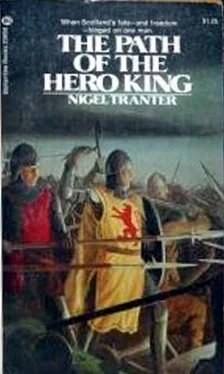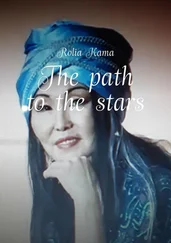The King moved back to his own throne, stood for a few moments, and then sat. With a great sigh and much rustling and shuffling, the concourse took their seats and settled down.
The Scots regalia had been confiscated and taken south by King Edward in 1296, and never replaced. But after another flourish of trumpets, a gesture was made at representing these. Heralds brought up in succession Bruces own long two-handed blade, as sword of state; a wand of office of the Silversmiths Guild to serve as Sceptre; the golden spurs used at the coronation, and preserved jealously by the little Abbot of Scone; and the great and distinctly battle-worn Lion Rampant Standard. There was no Crown, other than the gold circlet the King already wore, and no Orb. These symbols should have been presented by the appropriate officers-of state; but since only the Steward and the King of Arms were available, heralds brought them up, knelt before the monarch, holding the objects out for Bruce to touch, and then placing them on the Chancellors table to the left.
This done, the King of Arms signed for another fanfare, and then called out, I, High Seannachie of Scotland, declare this parliament and council of the kingdom and community of the Scottish realm, in the presence of the high and mighty Prince Robert, by Gods grace King, with the three estates of that realm here assembled, to be duly constituted and in session. God save the King!
After the bellowed response to this, which went on and on, Bruce raised hand again, remaining seated.
My lords and lieges here in session assembled-hear me, Robert. This day is a great day for this ancient kingdom, the most ancient of continuing subsistence in all of Christendom. It is the first parliament of my reign, the first for many bloody years. But more important still, it represents the resumption of ride and governance in this land, out of the blood stained hands of the invader. Today, thanks to the courage and resolution, to the sacrifice and death of so many, and despite the error and folly of some, this Scotland stands a realm again. We are still invaded, our land defiled by the usurpers, still threatened by the might of England, Lothian and the SouthEast wholly occupied.
But we are free men again, able to make our name and fame heard once
more in the courts of Christendom. And especially in the court of the
Plantagenet. To that end we must plan our strategies, muster our
resources expend our energies, to the best of our abilities. Hence
this parliament. Let us give thanks to God and Hissaints who have
made it possible-especially the blessed Saint Andrew our patron, in this his city; nor forgetting the hallowed Saint Fillan, in whose especial care I have walked these many months. I, who sit upon a Celtic throne, the throne of one hundred monarchs, of Kenneth and Malcolm, Duncan and MacBeth, Can more and David, and their predecessors and successors-I call upon two men to pray for Gods blessing upon this assembly. The Dewar of the Coigreach, representative of the Abbots of Glendochart, in the Old Church, who gave me blessing when most I needed blessing. And Abbot Henry of Scone, who has served Scotland, and me, notably. I, the King, call these.
While from the benches of the clergy commissioners the small gnome like person of Abbot Henry came forward briskly, a herald went to a vestry door opening from the south transept, to emerge again with the extraordinary hermit-like figure of the old Dewar, brought with some considerable difficulty from far Glen Dochart It had been found impossible to part him from his rags, and he had blankly refused to don any of the Romish copes, chasubles or albs offered as a cover-up, plain or magnificent. However, the King had presented him with a fine black travelling-cloak, as a personal gift, and he had been persuaded to wear this, as showing suitable appreciation;
and though the rags bulged out and showed very obviously beneath, at least the quite splendid and heavy gold-serpent belt of Celtic workmanship had been put on outside to hold the whole lot approximately together, looking strangely authoritative.
Saint Fillans famous crozier in hand, and venerable white locks and beard in tangled profusion, this eye-catching spectacle stumped over to the dais behind his superior-looking guide, scowling on all around while the astonished murmur of much of the assembly grew and was shot through with widespread tittering.
Bruce stopped that promptly and effectively by rising from his throne and holding out his hand to the old man-an unprecedented mark of respect, which necessarily brought everyone else to their feet likewise, the noise and the scraping of chairs and forms drowning any remaining sniggers.
Abbot Henry, who was fortunately an unconventional cleric himself, and no forma list as well as having a well-developed sense of fun, bowed to the Dewar, got no response, patted his shoulder nevertheless, and smiled genially.
The other raised his staff high, almost threateningly, and without waiting for any sign or cue, launched into a most vehement flood of Gaelic. Normally this is a liquid-sounding, misleading gentle-seeming language-but the Dewar of the Coigreach made it sound quite otherwise. Presumably what he was pronouncing was a prayer of blessing directed towards his Maker; but it sounded in fact more like a wholesale denunciation directed at the company present, delivered with quivering intensity. Fortunately it did not last long. Abruptly it ended, and as abruptly, without waiting to hear his Romish colleagues contribution, or making any acknowledgement to the monarch, the Dewar turned and stalked off as he had come.
Bruce kept a straight face throughout, and now inclined his head almost imperceptibly to the Abbot of Scone. His notion of bringing the Dewar here had been a gamble from the first. But despite this peculiar behaviour-which he had in fact anticipated-he was well enough satisfied. The gesture had been made.
However comic or even unseemly might be the impact on the majority of Lowlanders present, on the Highlanders it would be otherwise In two centuries the Romish Church had made only superficial headway in the West Highlands and Islands, and the ancient Celtic religious tradition still meant much, however inactive, latent. Bruce, above all, was concerned to rule a united kingdom, an idea almost totally abandoned since the Norman-French had come to Scotland. The Celtic Church was a dead letter, of course, and could not be revived; but gestures such as this could greatly affect Highland sentiment.
Abbot Henry, a shrewd and practical man, saw what was required and, as the apparition disappeared into the vestry, staff thumping vigorously, made an equally brief but more conventional application for the Creators blessing on their deliberations, and enduring mercies on the King, on the one Church, Holy, Catholic and Apostolic, and on all present, before bowing and returning to his place.
The monarchy, and all others, sat down with some relief.
I now call upon the Chancellor to proceed with the business of this assembly, Bruce declared, in practical tones.
As is his duty and office.
Lamberton stood up.
Your Grace, my lords and commissioners, he said.
It is my great joy that I am able to be here for this great and memorable occasion. How I have achieved this, from ward in England, is not for me to explain to this parliament.
Suffice it to say that I deemed it my prime duty to achieve this presence, at whatever cost-for two reasons. In order to support and acclaim our admired and heroic liege lord, King Robert, in his first parliament-without whom not only would there be no parliament but no Scotland today … He waited until the storm of applause had spent itself.
And second, that I might decently and duly open this session, as
Читать дальше












